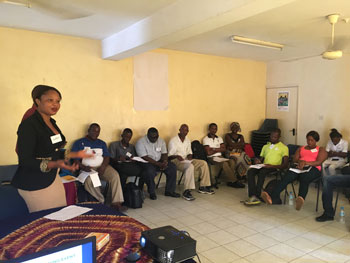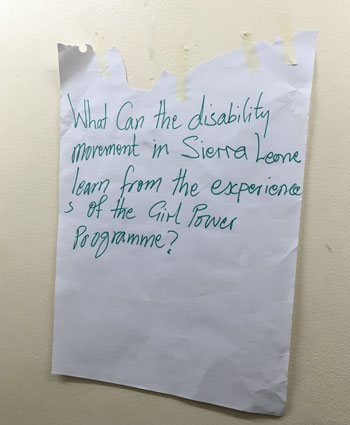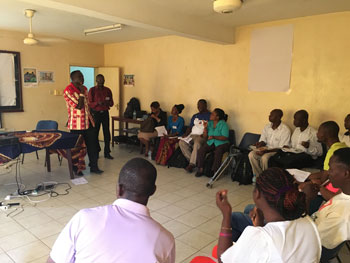Learning event: advocacy for youth with disabilities in Sierra Leone
 Since 2015 the African Studies Centre Leiden and the Liliane Foundation work together in a learning programme on lobby and advocacy for children with disabilities. Based on research in Sierra Leone and Cameroon, the programme seeks to understand the factors that explain the success and failure of lobby & advocacy for children with disabilities. Moreover, the knowledge generated in the programme is used to strengthen the capacity of Liliane Foundation and its local civil society partners to support, design and implement effective lobby & advocacy strategies. Learning events organized in Sierra Leone and Cameroon play an important part in the capacity strengthening. During these events preliminary research findings are presented to local stakeholders and their practical implications are discussed.
Since 2015 the African Studies Centre Leiden and the Liliane Foundation work together in a learning programme on lobby and advocacy for children with disabilities. Based on research in Sierra Leone and Cameroon, the programme seeks to understand the factors that explain the success and failure of lobby & advocacy for children with disabilities. Moreover, the knowledge generated in the programme is used to strengthen the capacity of Liliane Foundation and its local civil society partners to support, design and implement effective lobby & advocacy strategies. Learning events organized in Sierra Leone and Cameroon play an important part in the capacity strengthening. During these events preliminary research findings are presented to local stakeholders and their practical implications are discussed.
 On 24 August, the first learning event in Sierra Leone took place. This event focused on the advocacy efforts of the One Family People (OFP), the local strategic partner of Liliane Foundation in Sierra Leone. Since 2011 OFP has been working to promote equal rights and opportunities for girls and young women whilst paying particular attention to issues related to sexual violence and teen pregnancies. In doing so, OFP has paid specific attention to girls with disabilities as these suffer from sexual violence to a disproportionate extent. The research conducted by MA-student Emma Frobisher into OFP’s advocacy work formed the starting-point of the learning event. Emma’s research examined how OFP strategically presented or ‘framed’ its advocacy messages to various target audiences and the extent to which young people with disabilities took part in the advocacy.
On 24 August, the first learning event in Sierra Leone took place. This event focused on the advocacy efforts of the One Family People (OFP), the local strategic partner of Liliane Foundation in Sierra Leone. Since 2011 OFP has been working to promote equal rights and opportunities for girls and young women whilst paying particular attention to issues related to sexual violence and teen pregnancies. In doing so, OFP has paid specific attention to girls with disabilities as these suffer from sexual violence to a disproportionate extent. The research conducted by MA-student Emma Frobisher into OFP’s advocacy work formed the starting-point of the learning event. Emma’s research examined how OFP strategically presented or ‘framed’ its advocacy messages to various target audiences and the extent to which young people with disabilities took part in the advocacy.
 During the learning event Emma presented her preliminary research findings to a group of about 25 people consisting of various stakeholders, including OFP-staff, members of civil society, activists working in the field of disability and gender and people targeted by the advocacy work. After the presentation of the findings, Dr. Alex Mbayo of Fourah Bay College facilitated a participatory session to tease out the research’s practical implications. After several rounds of lively discussion in small groups, the participants presented their insights during a plenary session.
During the learning event Emma presented her preliminary research findings to a group of about 25 people consisting of various stakeholders, including OFP-staff, members of civil society, activists working in the field of disability and gender and people targeted by the advocacy work. After the presentation of the findings, Dr. Alex Mbayo of Fourah Bay College facilitated a participatory session to tease out the research’s practical implications. After several rounds of lively discussion in small groups, the participants presented their insights during a plenary session.
Amongst other things, the discussions that followed highlighted the importance of the strategy of OFP in which both the ‘ableds’ as well as the ‘disableds’ were targeted, just as engaging with gender issues requires both the involvement of women and men. In addition, it became clear that people with disabilities need to be reframed from victims to people in charge of their own lives while stressing the economic value of the greater inclusion of persons with disabilities in society. Finally, the discussion made clear that the disability movement in Sierra Leone has to start speaking with one voice to the government.

